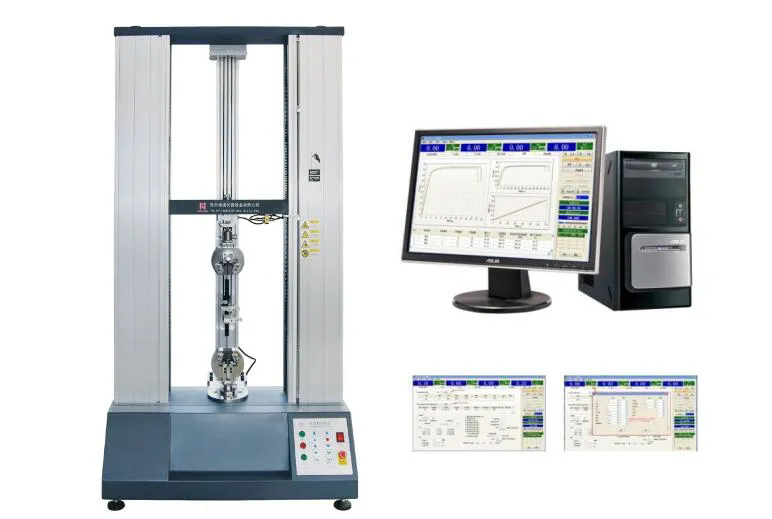Metal Material Testing Machines: A Q&A Overview
2024-10-23
Metal material testing machines are essential tools in industries like construction, automotive, aerospace, and manufacturing, ensuring that metals meet specific performance standards. These machines evaluate the strength, durability, and quality of metal materials, helping engineers and manufacturers maintain product safety and consistency. In this Q&A blog, we explore the functions, benefits, and applications of metal testing machines.
What Is a Metal Material Testing Machine?
A metal material testing machine is equipment designed to assess the mechanical properties of metal samples. It performs various tests to measure attributes like tensile strength, hardness, impact resistance, and fatigue. These tests ensure that the metal can withstand the stresses and conditions it will encounter during real-world applications.
Why Is Metal Testing Important?
Testing is crucial to guarantee that metal components meet the necessary industry standards and performance requirements. Without proper testing, structural failures can occur, leading to safety risks, financial losses, and reputational damage. By identifying material weaknesses early, testing machines help manufacturers ensure product quality, reduce defects, and comply with safety regulations.
What Types of Tests Can These Machines Perform?
There are several common tests used to evaluate different properties of metals:
Tensile Test: Measures how much stress a metal can endure before breaking.
Hardness Test: Determines the resistance of metal to deformation or penetration.
Impact Test: Evaluates the ability of metal to absorb energy during sudden impact.
Fatigue Test: Simulates repeated stress cycles to determine how long the material lasts under constant or varying loads.
Bend Test: Assesses a metal’s flexibility and ductility by observing how it behaves when bent.
What Industries Use Metal Testing Machines?
Metal testing machines are employed across multiple industries to ensure the quality and performance of metal components. Key sectors include:
Construction: Testing ensures that structural steel and reinforcements can withstand heavy loads.
Automotive: Manufacturers evaluate the durability of metal parts to ensure vehicle safety and performance.
Aerospace: Rigorous testing of aircraft components is essential to meet stringent safety regulations.
Manufacturing: Quality control processes depend on testing machines to verify the reliability of metal parts in equipment and machinery.
Oil and Gas: Pipelines, valves, and fittings are tested to withstand extreme pressure and environmental conditions.
How Do Metal Testing Machines Work?
The working principle of metal material testing machines varies based on the type of test. For instance, in a tensile test, a sample is placed between two clamps and pulled until it breaks. Sensors measure the force applied and the material’s response. Similarly, a hardness test may involve pressing a specific tool against the metal surface and measuring the depth of the indentation. Each machine is equipped with precise sensors and software to record data, ensuring accurate results.
What Are the Key Features of a Good Testing Machine?
A reliable metal testing machine should offer:
High Accuracy: Precise measurement tools to ensure consistent results.
Durability: Machines must withstand heavy use in industrial environments.
User-Friendly Software: Easy-to-use interfaces for data collection and analysis.
Versatility: Ability to perform multiple tests on a wide range of metal types.
Compliance: Machines should meet relevant industry standards and certifications for testing procedures.
What Standards Govern Metal Testing?
Several international and national standards guide metal testing procedures, ensuring consistency and reliability. Common standards include:
ASTM International (ASTM): Defines global testing methods for various metal properties.
ISO Standards: Provide international guidelines for mechanical and chemical testing.
EN Standards: Used primarily in Europe, ensuring product safety and reliability.
Manufacturers and testing laboratories adhere to these standards to guarantee that products meet regulatory requirements and customer expectations.
How Has Technology Improved Metal Testing Machines?
Modern metal testing machines feature advanced technologies that enhance accuracy and efficiency. Digital interfaces and software allow real-time monitoring and data analysis. Some machines incorporate automation, reducing human error and increasing throughput. Non-destructive testing methods, such as ultrasonic and X-ray inspection, have also become more common, enabling manufacturers to evaluate materials without damaging them.
What Are the Challenges of Metal Testing?
Although metal testing offers many benefits, it also presents certain challenges.
Cost: High-quality machines and testing processes can be expensive.
Training Requirements: Operators need proper training to use machines effectively and interpret results.
Sample Preparation: Preparing metal samples to the required specifications can be time-consuming.
Machine Maintenance: Regular maintenance is necessary to ensure consistent performance and prevent downtime.
What Should Companies Consider When Choosing a Testing Machine?
When selecting a metal testing machine, companies should evaluate:
Test Requirements: Ensure the machine can perform all the necessary tests for the intended materials.
Accuracy and Reliability: Look for machines with high precision and proven reliability.
Compliance: Verify that the machine meets relevant industry standards.
Service and Support: Choose a manufacturer or supplier that offers maintenance and technical support.
Scalability: Consider future needs and ensure the machine can handle additional testing demands as the business grows.
Conclusion
Metal material testing machines play an essential role in ensuring the quality, durability, and safety of metal products across various industries. By measuring key properties like strength, hardness, and impact resistance, these machines help companies meet regulatory standards and maintain customer trust. As technology evolves, testing machines are becoming more efficient and accurate, driving improvements in product development and quality control. Choosing the right testing machine involves careful consideration of performance needs, compliance requirements, and long-term serviceability.



